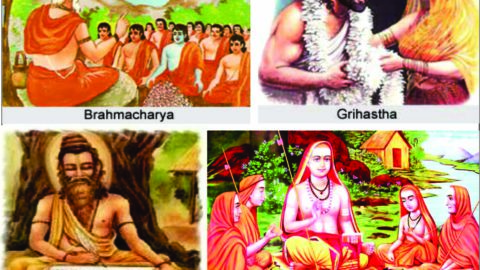Inner Transformation – In Gita Verse 2.54 Arjuna said: O Kṛṣṇa, what are the symptoms of one whose consciousness is thus merged in transcendence? How does he speak, and what is his language? How does he sit, and how does he walk?
Arjuna’s inquiry to Krishna regarding the traits of a person firmly rooted in wisdom and samadhi delves profoundly into the spiritual essence of the Bhagavad Gita. This questioning not only mirrors Arjuna’s authentic pursuit of enlightenment but also emphasises the importance of inner transformation and its external expressions.
Arjuna’s progression towards a significant shift in consciousness signifies a notable transformation in his approach to seeking spiritual wisdom. Before this critical juncture, Arjuna spoke with certainty and conviction, giving the impression of possessing a deep comprehension of righteousness, religion, and the greater good. However, beneath this veil of knowledge lay an element of ego that compelled him to seek external validation, even from Krishna, in a bid to fortify his position and share the burden of his decisions.
Arjuna’s demeanour suggested confidence but masked an inner conflict and a lack of genuine understanding. His eagerness for Krishna’s endorsement hinted at his need for reassurance and support, revealing an internal struggle with uncertainty and self-doubt. Seeking validation, Arjuna attempted to portray Krishna as a crutch – a support system he leaned on for validation and affirmation, akin to a vulnerable individual relying on a crutch for stability.
Contrastingly, figures like Krishna, embodying profound enlightenment and wisdom, do not merely serve as crutches but aim to empower individuals to stand independently. Krishna’s role transcends fostering dependence; instead, he nurtures growth, inner resilience, and self-realisation. By challenging Arjuna’s reliance on external validation and dismantling the props of ego, Krishna guides him towards a deeper understanding of self, purpose, and the essence of enlightenment.
Arjuna’s transformative journey alongside Krishna uncovers layers of his own arrogance, ignorance, and misconceptions. As his assumed certainties unravel and his reliance on external validations diminishes, Arjuna is propelled into a path marked by humility, introspection, and a sincere pursuit of wisdom.
This pivotal shift in Arjuna’s consciousness steers him away from a facade of wisdom driven by egoistic approval towards a genuine yearning for spiritual insight, understanding, and self-realisation. This metamorphosis creates the platform for a deep exploration of the self, consciousness, and the profound existential truths embedded in the teachings of the Bhagavad Gita.
Arjuna’s evolution from seeking external validation to earnestly seeking spiritual guidance signifies the profound essence of his character and the authenticity of his quest for enlightenment. This significant moment lays the groundwork for profound revelations and teachings from Krishna, guiding Arjuna towards a deeper comprehension of self, consciousness, and the pathway to transcendence.
With his inquiry into the qualities of one absorbed in transcendence, Arjuna displays profound curiosity and a keen desire to fathom the essence of wisdom and spiritual enlightenment. His quest extends beyond understanding the inner experiences of such individuals to recognising how their realisation manifests in behaviour, speech, and actions.
This dual exploration of the inner and outer dimensions of wisdom exemplifies Arjuna’s holistic approach to spiritual growth. He acknowledges that genuine wisdom transcends mere intellectual knowledge, emphasising the need to embody this wisdom in one’s way of living and interacting with the world.
Arjuna’s humble questioning signifies his readiness to acknowledge personal limitations and ignorance, paving the way for authentic learning and transformation. This humble inquiry creates a platform for Krishna to impart profound teachings and insights on consciousness, wisdom, and devotion.
Krishna’s responses to Arjuna’s inquiries shed light on the importance of humility, curiosity, and openness in the pursuit of spiritual knowledge. Through Krishna’s profound insights and guidance, Arjuna gains a deeper understanding of reality, consciousness, and the path to self-realisation.
In essence, Arjuna’s inquiry serves as a potent reminder of the significance of humility, curiosity, and a sincere thirst for knowledge in the spiritual journey. It underscores that genuine wisdom transcends mere acquisition of information, urging individuals to embody spiritual truths in their thoughts, words, and actions. Arjuna’s inquiry opens the door to a profound exploration of self, consciousness, and the journey towards ultimate liberation as elucidated in the teachings of the Bhagavad Gita.
Tags: Inner Transformation





